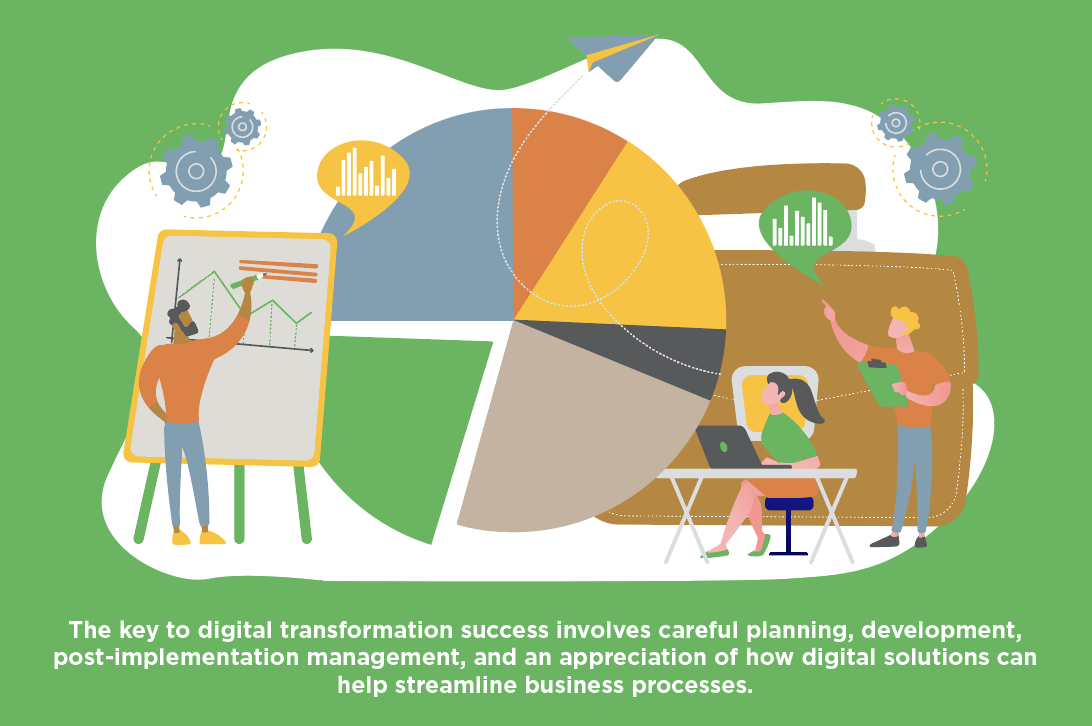Organizations across the supply chain are embracing digital transformation and increasingly weaving digital technologies into their strategies. This evolution is revolutionizing how businesses operate and deliver value. Boston Consulting Group (BCG) found that over 80% of corporate executives across industries plan to accelerate their digital transformation efforts in the coming years. However, many companies continue to combat two main obstacles: misunderstanding the digital transformation lifecycle and not knowing where to start. The key to success involves careful planning, development, post-implementation management, and an appreciation of how digital solutions can help streamline business processes.
Evaluating your digital transformation strategy
The digital transformation lifecycle refers to integrating digital technologies throughout the supply chain process to enhance visibility, traceability, and efficiency — all while mitigating risk. The term “lifecycle” highlights that this transformation is a continuous process that requires evaluating emerging technologies and evolving market demands.
The initial phase of an effective transformation includes a comprehensive four-step planning and analysis process:
- Understanding the strategies and objectives of the business.
- Assessing the current state of the organization’s digital capabilities.
- Identifying areas of improvement.
- Defining metrics and desired outcomes of digital change.
By laying the foundation for the entire process, careful planning and analysis become the cornerstones of successful digital transformation. Supply chain organizations can use process mapping, customer journey mapping, SWOT analysis, and creating digital transformation frameworks as the groundwork for this approach.
Digital transformation services from Inspirage give your teams access to efficient, innovative, and connected solutions that help your business realize the full potential of digital transformation, drive faster decision-making, and empower organizational leaders with critical insights. We deliver strategic advisory services, business intelligence and analytics, and more to enact real change and help you build an integrated supply chain.
According to one report, 70% of teams already have a digital transformation strategy or are currently working on one; however, establishing a thoughtful approach is only the first step in fostering a streamlined digital transformation lifecycle.

Developing a comprehensive plan for implementation
The implementation phase of supply chain transformation involves launching new digital tools, technologies, and processes to enhance operations, but how can companies encourage more effective deployments? First, those executing the plan should have the skills and expertise needed to introduce new digital systems. In light of the fact that 70% of transformations fall short of their objectives due to employee hesitation, it is critical to develop change management procedures to minimize resistance to change from all stakeholders.
Key considerations in this stage include:
- Establishing clear communication channels.
- Defining metrics for measuring outcomes (e.g., efficiency, revenue, costs, or customer satisfaction).
- Providing training and support to the teams adopting new tools and technologies.
The application and integration experts from Inspirage have the industry insights and experience necessary to help supply chain-focused organizations get the most out of their digital transformation investments in an accelerated manner. We combine unparalleled systems consulting expertise with proven methodologies, a robust arsenal of over 100 industry-focused solutions, and application proficiency to enable best practices throughout the digital transformation lifecycle.
Managing digital strategies post-implementation
Digital transformation does not end after implementation; it is an ongoing process. The final phase of the digital transformation lifecycle calls for organizations to continuously monitor and maintain the tools and technologies put in place during the implementation stage and to evaluate and refine their ongoing supply chain strategies.
A successful post-implementation strategy should include:
- Ongoing education and training to keep teams up-to-date with the latest digital advancements.
- Reviewing and maintaining the chosen digital strategies with a dedicated team.
- Gaining actionable insights into supply chain performance with data and analytics.
- Remaining agile and resilient in the face of technological change to stay ahead of emerging trends and remain competitive.
Following a transformative Oracle Cloud implementation, Managed services from Inspirage augment an organization’s internal capabilities. Inspirage offers an end-to-end suite of business process services that make life easier for IT and business personnel and allow companies to deploy their talent where it matters most.
Maintaining an end-to-end digital transformation lifecycle
By strengthening all phases of the digital transformation lifecycle, organizations can create a full-spectrum, dynamic, and agile supply chain capable of keeping pace with changing market conditions, evolving customer demands, and emerging industry trends as they unfold. A digital business study from Foundry reports that 93% of companies have adopted or have plans to take on a digital-first business strategy. This trend has led to accelerated investments in technology. Companies introducing powerful digital transformation strategies to encourage growth and competitiveness collaborate with Inspirage as they build better supply chains. Contact us to learn more about how Inspirage can support your business.